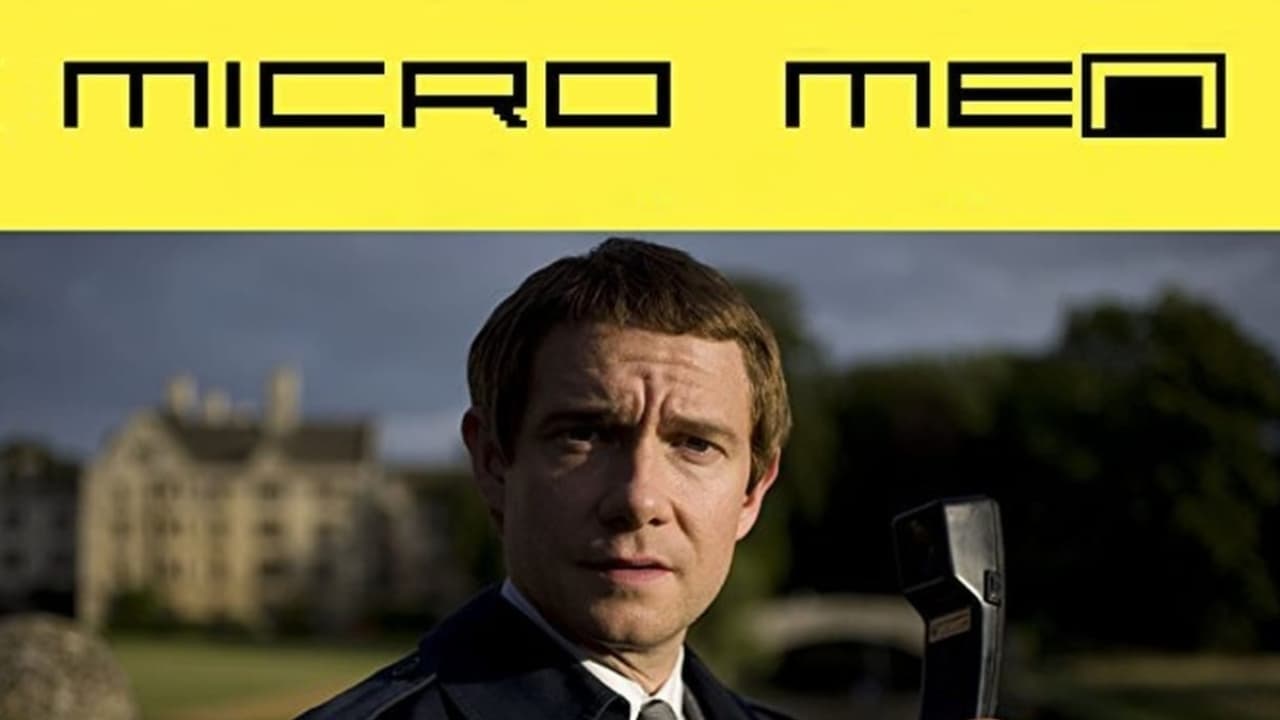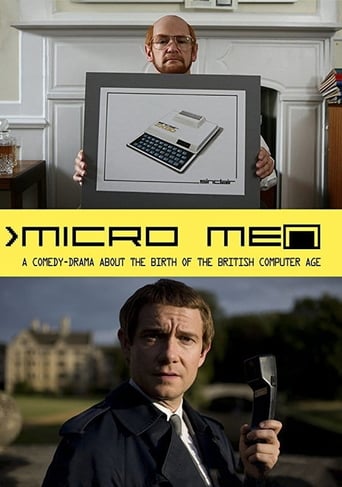

Perfectly adorable
... View MoreFrom my favorite movies..
... View MoreIt's funny watching the elements come together in this complicated scam. On one hand, the set-up isn't quite as complex as it seems, but there's an easy sense of fun in every exchange.
... View MoreOk... Let's be honest. It cannot be the best movie but is quite enjoyable. The movie has the potential to develop a great plot for future movies
... View MoreMicro Men is an interesting look at this early British microcomputer industry, but the viewer must always keep in mind that these events occurred in Britain's isolated, self-important microcosm, and had virtually no relevance to the real microcomputer industry as a whole. As with all British-produced programs dealing with computer history, Micro Men is hilariously Brit-centric, to the point of being fantasy. This self-delusion can even be seen in the IMDb summary for Micro Men, which refers to "Clive Sinclair, British inventor of the pocket calculator". Not only did Sinclair not invent the pocket calculator, but he didn't even invent his *own* pocket calculator, which used an American-made Texas Instruments single-chip calculator, similar to the chips used in many early TI hand-held and desktop calculators. Sinclair literally only invented the box that held the TI chip. This of course will set the tone for Britain's entire microcomputer industry -- inferior repackaging of technology from the United States and claiming it as their own, and then further exacerbating the delusion by making false claims of being 'first', 'best', 'most important', etc. Britain has an extensive history of grotesquely overstating their relevance in the computer industry, which stretches all the way back to World War II, and Micro Men is no exception to this behavior.After watching Micro Men, you're left with the utterly erroneous impression that Sinclair and Acorn were on the verge of dominating the home computer industry, yet somehow let it slip through their fingers. Of course, the movie never really tells you *what* they did wrong, as that would require a direct confrontation of the fact that they were five years late to the party, and showed up with hardware which was vastly inferior to what was being produced in the United States and other countries. As England slowly escaped the early 1980s economic recession, Sinclair's $99 doorstops became progressively less appealing. Meanwhile, the computer and video game crash in the United States dragged American offerings down into the price range of Acorn's products, stripping Acorn of their only significant advantage.When Sinclair and Acorn attempted to escape the economically protective confines of Great Britain, they were met with much-deserved scorn and ridicule. Quite simply, neither company ever had a chance of survival in an environment of global competition.
... View MoreI watched this single piece drama last night on BBC4 and thoroughly enjoyed it from start to finish.All the actors did a fine job and convinced - despite Mr Armstrong's (Sinclair) rather obvious makeover for the role. The mixture of archive footage and new filming hit a balance that was enjoyable.The programme addresses the beginnings of the Home Computer industry in the UK and the roles & rivalries of Sinclair and Acorn in those early days. For those of us of a certain age it was extremely nostalgic stuff (even though I ended up getting a CBM 64)! A mixture of reality, light comedy and invention (some scenes were 'invented' according to the titles) kept me engrossed and actually rather disappointed that it had finished so soon; I think a 2 part show would have kept me interested.Some of the most fascinating stuff for me was a reminder of some of the side issues, for instance the UK general public's initial reaction to the technology - those of us who bought them were considered 'hobbyists' at the time. However, on reflection possibly the most important side- effect was the fact that a public organisation like the BBC was allowed to pursue the making of its own branded model in an attempt to raise the nation's computer literacy above other's. The BBC model B sold widely in schools, this combined with the home market growth must surely have contributed enormously to the strength of the UK programming industry (of which I was part) in the formative years. Whilst never rivalling IBM and HP in the end (as poignantly if somewhat mawkishly shown in the final scenes) this era and the people involved, must be considered as a time which generated huge revenue for the UK as well as a great platform for the public to get to grips with computers. Our programmers are still regarded as some of the world's most creative, despite financial difficulties; and this period ensured that as a nation we are not only regarded for older, but venerable, media such as the pop music & individual greatness in film & drama.Highly entertaining as a drama, thought provoking if you care about the beginnings of the industry; I was entertained and amused throughout. Recommended.
... View MoreThis was a generally enjoyable watch and I'm grateful that anyone would make a programme on such a "niche" topic, however it was not without flaws. For a start, as has been mentioned by other reviewers, Sir Clive is painted as borderline psychotic with serious anger management problems, whereas Curry is some kind of super-good Luke Skywalker of the computing world. I'm sure it can't have been as clear-cut as this. It's also true that Alexander Armstrong's acting is very mannered and feels like something out of a comedy sketch show, while Martin Freeman gets to act much more naturally.The second problem is really just an anachronism caused by poor library footage placement. At the computer fair/exhibition we see the team telling reporters about the capabilities of the new Acorn Atom, and we also see Clive Sinclair talking to the Sinclair User journalist about issues to do with the "new" ram pack for the ZX81. Even leaving aside whether these two events happened at the same computer fair, since blah blah artistic license etc., there are two pieces of library footage shown, as if they are taking place at the same event. The first piece of film shows some schoolboys using some computer that I can't identify from the clip, playing a game, then the next clip shows a man trying out an Amstrad CPC464. This computer wasn't introduced until much later: 1984 in fact and is really out of place. I don't know about other people but it caused me anguish seeing it.
... View MoreJust saw this on BBC4. A very interesting take on how close the UK came to dominating the world computer development and manufacturing industry in the early 80s, only for it to all fall apart just 5 years later.Despite some garish and unconvincing make-up, Armstrong shows he can do serious drama in his portrayal of Sir Clive Sinclair, the man who brought affordable computing to the masses. Martin Freeman is good (as always) as the confidante in Sinclair's company who, unable to understand Sinclairs bloody mindedness over what to concentrate their efforts on, leaves and sets up arch rival 'Acorn Computers' with an Austrian business partner.The production team have done a solid job in displaying the drabness of the era. The mix of archive TV footage of the time inter-cut with this filmed TV drama works quite well. The background story of how the UK became a world leader in the home PC market, and then blew it, is a fascinating tale for anyone interested in recent history. At one point Freemans character turns to Sinclair and says 'We could have been the British IBM but you wouldn't listen to me' is very apt. Sinclairs obsession with the notorious C5 is also addressed. It does make you wonder what would have happened had there been more cohesion in the industry at the time rather than the arrogant self interest of the industry that resulted in the UK losing such a massive foothold.A thought provoking drama that has just enough momentum to keep itself interesting despite some flaws.
... View More